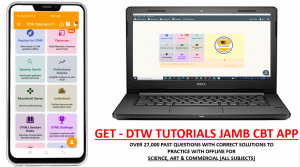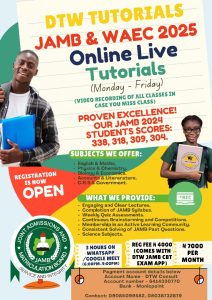PURE AND IMPURE SUBSTANCES
PURE SUBSTANCES – These are substances that consist of a single particle (atoms or molecules), with uniform structure and definite composition. They are usually either elements or compounds.
CHARACTERISTICS OF PURE SUBSTANCES
- Homogeneous in nature.
- Uniform/definite composition.
- Consistent properties.
- Exhibits chemical stability.
- Cannot undergo physical separation.
IMPURE SUBSTANCES – Also known as mixtures. These are substances which contains two or more constituents (different kinds of particles) that are not chemically bounded.
CHARACTERISTICS OF IMPURE SUBSTANCES
- Heterogeneous in nature.
- Indefinite composition.
- Undergoes physical separation of constituents.
- CRITERIA FOR PURITY
- BOILING & MELTING POINT – Impurities raises the boiling point and lowers the melting point. (NB: This is fixed at a certain temperature for pure substances).
- CHROMATOGRAPHY – A pure substance gives one spot on the paper chromatograph.
- ELEMENTS, COMPOUNDS AND MIXTURES
ELEMENTS – These are substances which cannot be split into simpler units by an ordinary chemical process. There are six types of elements grouped in form of a periodic table: the reactive metals, transition metals, lanthanides and actinide, pure metals, non-metals, and noble gas. They are either naturally occurring or made in the laboratory.
COMPOUNDS – These are substances which contains two or more elements chemical combined. Examples include water, H2O, limestone, CaCO3, SiO2 etc.
MIXTURES – These are substances that contains two or more constituents which can easily be separated by a physical method. Examples include air, sea water, urine, blood, crude oil, soil, milk, palm wine etc.
- COMPARISON OF MIXTURES AND COMPOUNDS
| S/N | MIXTURE | COMPOUND |
| 1 | Homogeneous or heterogeneous in nature. | Homogeneous in nature. |
| 2 | Constituents are not chemically bounded together. | Component elements are chemically bounded together. |
| 3 | Constituents are present in any ratio by mass. Hence, cannot be represented by a chemical formula. | Components are present in a fixed ratio by mass. Hence, it can be represented by a chemical formula. |
| 4 | Properties are the sum of those of its individual components. | Properties differ entirely from those of its component elements. |
| 5 | Undergoes physical separation method | Cannot undergoes physical separation method |
- CHANGES IN MATTER
PHYSICAL CHANGE – One which is easily reversed, and which no new substances are formed. There is no change in mass and requires little amount of heat for changes to take effect. Examples:
- Dissolution of solutions.
- Change in the state of matter.
- Separation of mixture.
- Magnetization and demagnetization of substances.
CHEMICAL CHANGE – One which cannot be easily reversed, and new substances are formed. There is a change in mass and requires a great amount of heat for changes to occur. Examples:
- Burning of materials.
- Rusting of iron.
- Slaking of lime.
- Changes in electrochemical series.
- Fermentation and decay of substances.
- SEPARATION TECHNIQUES
Separation techniques involves a system which makes use of the physical properties of the constituents of a mixture for separation. They include:
- SEIVING – Used to separate solid particles of different sizes.
- MAGNETIC SEPARATION – Used to separate magnetic substances from non-magnetic ones.
- SUBLIMATION – Used to separate solids that can sublime from other solids.
- DECANTATION – Used to separate mixtures containing solid and liquid particles with two (or more) distinct layers.
- FILTRATION – Used to separate solid particles from liquids using a filter paper.
- CENTRIFUGATION – Using a centrifuge (a machine that spins test-tubes containing suspensions at high speed) to separate suspensions into heavy solids at the bottom, and clear liquid at the upper layer, which can easily be decanted.
- CRYSTALLIZATION – Used to separate salt which decomposes easily on heating from their solutions. (NB: used where purity is important e.g drug and sugar industries).
- FRACTIONAL CRYSTALLIZATION – Used to separate two or more solid solutes present in the same solution, but with different solubilities at different temperatures.
- PRECIPITATION – Mixtures are separated using the difference in the solubility of a solid in two miscible liquids.
- DISTILLATION – Used to recover solvents from its solution.
- FRACTIONAL DISTILLATION – Involves the use of a fractionating column to separate a mixture of two or more miscible liquids based on their boiling point.
- SEPARATING FUNNEL METHOD – Used to separate two immiscible liquids e.g kerosene and water, petrol and water etc.
- CHROMATOGRAPHY – A technique used to separate and analyze mixtures based on their chemical properties. It is carried out by moving a solvent over a porous absorbent medium (e.g paper, gel).
- APPLICATION OF SEPARATION TECHNIQUES
- Sieving in mining industries.
- Filtration in water purification plants.
- Evaporation in salt making industries.
- Distillation in gin and water distilleries.
- Crystallization in drugs and sugar manufacturing.
- Fractional distillation in petroleum industries.
- Chromatography in laboratories etc.
DTW Tutorials Study Resource Links;
First of All to obtain high JAMB &WAEC Scores, YOU HAVE TO Practice! Practice!! Practice!!
Use DTW JAMB & WAEC 2025 CBT Practice App!!!
– GET DTW TUTORIALS JAMB & WAEC 2025 CBT EXAM PRACTICE APP for all Subjects with over 31,000 Past Questions and Correct Solutions to Practice with offline! (Activation cost is N4000 for 1 year) Download Links Below for Mobile Phones & Laptop Computer;
DTW TUTORIALS JAMB 2025 APP For MOBILE Phone Direct Download link;
https://play.google.com/store/apps/details?id=com.iafsawii.dtw.jamb
DTW TUTORIALS JAMB 2025 APP For DESKTOP Laptop Computer Direct Download link; https://drive.google.com/file/d/1iIHBoWjEeJeCFyTO9nt-9kAveH2FqjrT/view?usp=sharing
Download Links for WAEC 2025 App;

JAMB RESOURCE LINKS BELOW;
– JAMB Past Questions Solved Playlists on Math, Phy, Chem; https://www.youtube.com/playlist?list=PLLgYU6fS5143-p4dfWIFL7keuB1SBgT2b
– THE LEKKI HEADMASTER – Summary, Questions And Answers (JAMB 2025 NOVEL); https://dtwtutorials.com/the-lekki-headmaster-jamb-2025-novel-summary-questions-and-answers-pdf-download/
– JAMB 2025 Recommended Text Books – https://dtwtutorials.com/jamb-2025-recommended-text-books-for-all-subjects/
– JAMB 2025 Syllabus all Subjects – https://dtwtutorials.com/jamb-2025-syllabus-free-download/
– JAMB 2025 Syllabus in 30 Days Timetable Challenge by DTW Tutorials for Science, Art & Commercial Subject Combinations – Cover Your JAMB Syllabus in 30 Days Challenge; https://dtwtutorials.com/jamb-2025-syllabus-in-30-days-timetable-challenge-by-dtw-tutorials-cover-your-jamb-syllabus-in-30-days-challenge/
– How to Manage Your Jamb Exam Time for High Scores; https://youtu.be/Tp4Va8haib8
– Physics Notes and Questions on All topics; https://dtwtutorials.com/category/tutorials/physics-tutorials/
– Chemistry Notes and Questions on All topics; https://dtwtutorials.com/category/tutorials/chemistry/
– How to Read, Understand and Remember Always- https://youtu.be/kL8BpRePudA
– How to Cover Your JAMB Syllabus Fast in 30 Days!!; https://youtu.be/RVgyn01Ptd0
– What to do a night before your Jamb Exam (+Exam Prayers); https://youtu.be/njbAx4Oz5Rw
– How to Manage Your Jamb Exam Time for High Scores; https://youtu.be/Tp4Va8haib8
– Overcoming Exam Fear/Anxiety– https://youtu.be/Uvf81rvd0ls
You can also join our online groups below for instant JAMB 2025 Updates;
Join DTW JAMB 2025 Intensive Tutorials Study Groups on Facebook, Telegram and WhatsApp Group;
Facebook Group – https://web.facebook.com/groups/dtwtutorialsgroup/
WhatsApp Group – https://chat.whatsapp.com/E8pprCQYtahKfpQN9UB0aU
Telegram Group – https://t.me/+AcXfhJPSIiI2ZTY0
WhatsApp Channel – https://whatsapp.com/channel/0029VaAWvTmDDmFT9o25dV3u
DTW JAMB 2025 Intensive Online Lessons/Tutorials
Online JAMB 2025 Tutorials – Your Path to Jamb Success!
Are you preparing for the JAMB 2025 Exam and aiming for excellence? Look no further than Online Jamb Tutorial by DTW Consult. We’re dedicated to helping you ace your Jamb with confidence.
- Why Choose DTW Online JAMB Intensive Tutorials?
• Engaging, Clear and Interactive Online Lectures
• Completion of JAMB Syllabus
• Weekly Quiz Assessments
• Continuous Brainstorming and Competitions
• Membership in an Active Learning Community
• Consistent Solving of JAMB Past Questions-
• Expert Jamb Instructors
• Comprehensive Study Materials - All Classes are Recorded!! In case you miss any class, and when you join us you will have access to all the previous class recorded videos!!!
• Subjects;
English
Physics
Chemistry
Biology
Math
Economics
Literature
Crs
Government
• Affordable Tuition – N7000 monthly (6pm – 10pm, Mon to Fri)
Lectures Ongoing! Register Now!!
Bank Details:
Account Name: DTW Consult
Account Number: 6414330770
Bank: Moniepoint
Amount – N7000
For easy payment and enrollment.
Proof of payment should be sent by WhatsApp.
Contact Us:
WhatsApp: 09085099582, 08038732879
Email: dtwconsultng@gmail.com
Take a step closer to your Jamb success with DTW Online Jamb 2025 Intensive Tutorials.
Let’s work together to unlock your full potential!

https://youtu.be/P7wtBH46ZMMnsive Tutorials. Let’s work together to unlock your full potential! #JambPrep #OnlineTutorial #DTWConsult #JambSuccess #jamb2025 #utme2025

No Comments